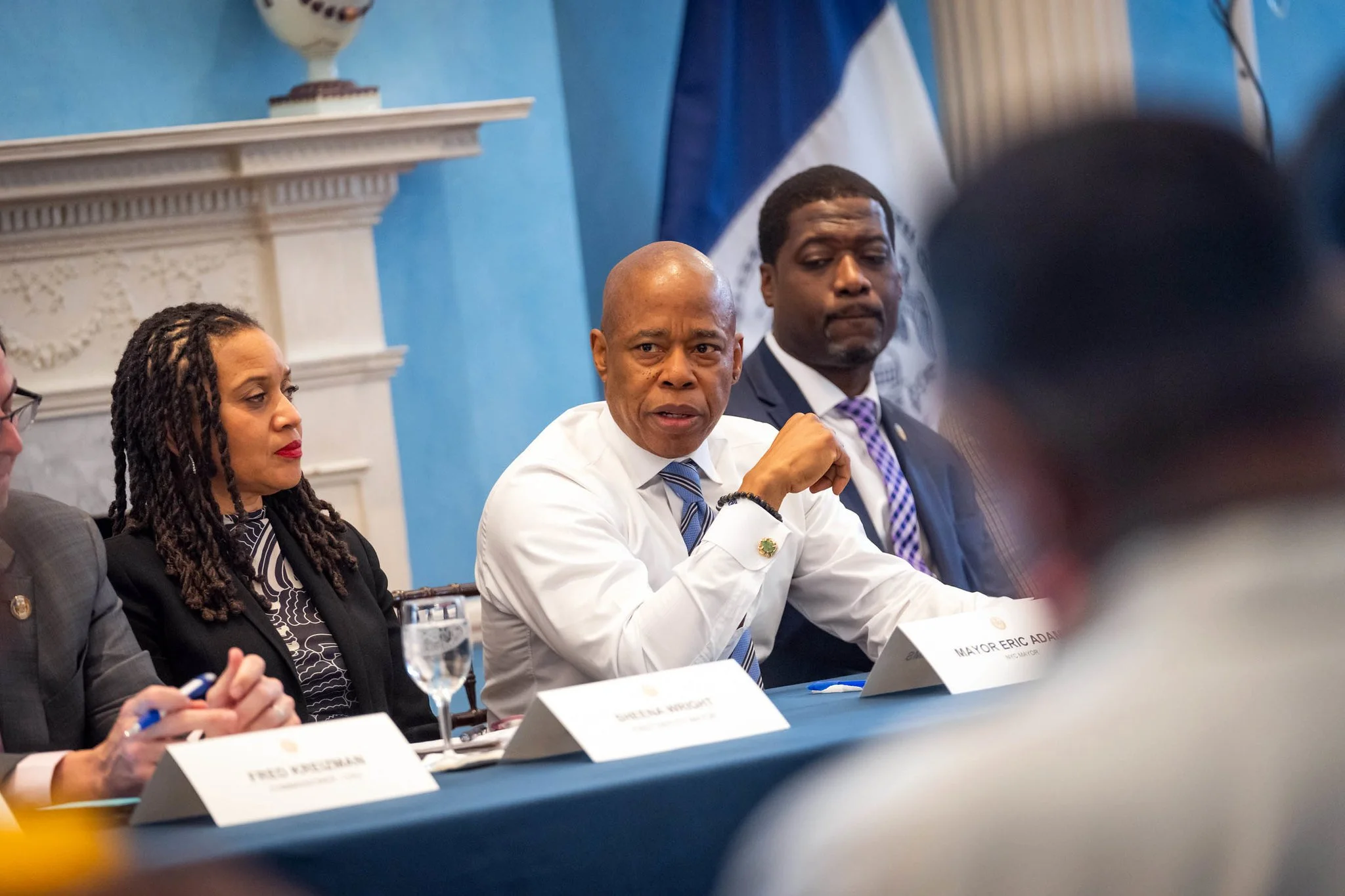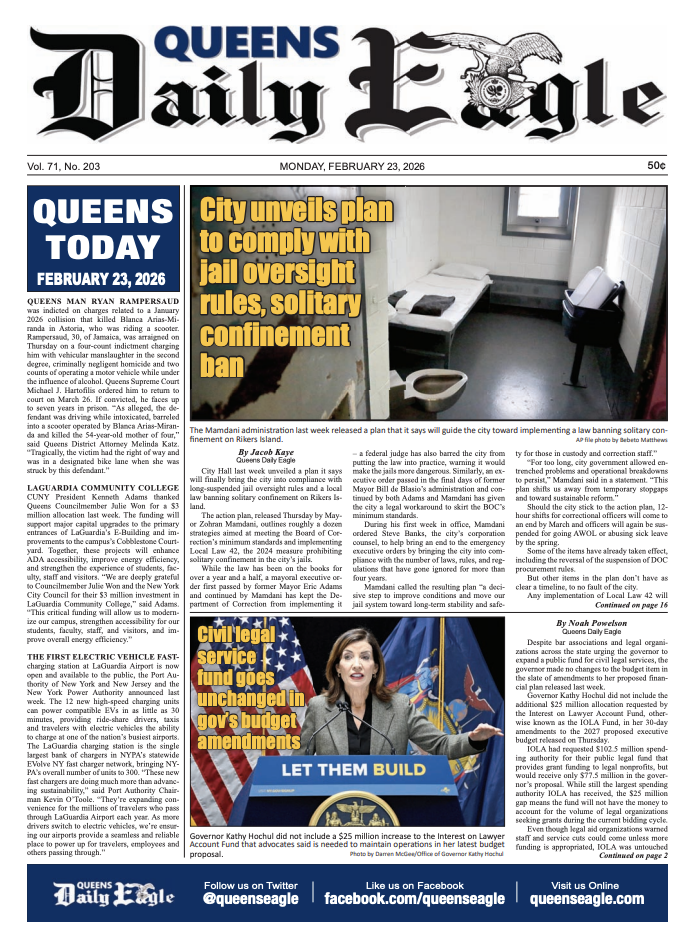Queens residents struggle as CityFHEPS lawsuit plays out
/Astoria resident Alexis Tsahirides and her partner, who face eviction over her father’s unpaid rent debts, debts she’d get help with under the City Council’s expanded CityFHEPS program. Courtesy of Tsahirides
By Ryan Schwach
When Alexis Tsahirides secured the rights to her family’s Astoria apartment, she hoped to pay back her dad’s debts with help from the city’s housing vouchers.
Tsahirides would be eligible to receive aid under the CityFHEPS housing voucher program, which was expanded by the City Council last year. However, the Adams administration has yet to have implemented the law, so she has yet to receive any assistance.
The Legal Aid Society and the City Council are currently fighting in the courts to get the city to implement the council’s legislation that would provide the vouchers Tsahirides could use to pay her debts.
As she waits for the case to play out, the 25-year-old is facing eviction and fears she may wind up out on the streets.
“It's hard to keep myself together some days because of overwhelming stress,” said Tsahirides, who is a dog walker and full-time aid for her partner who has autism as well as spinal stenosis. “If I'm being completely honest, I don't feel like getting out of bed sometimes because of how stressful it is. It's a tough burden on me.”
At the age of 19, Tsahirides was kicked out of her home by her mother so she could move in a boyfriend, leading Tsahirides to Maya’s Place, a shelter for female-identifying youth in the Bronx.
“Because of all the bad rap that I've heard from friends who've I've made who've been through the shelter system I decided to go through a youth shelter which I felt way comfortable in,” she said.
She spent around a month at the shelter, ultimately moving back in with her mother, only to be kicked out again for another boyfriend.
She then moved in with her father, who she described as “never financially responsible,” in Astoria.
Tsahirides began paying her father rent, but soon realized he wasn’t giving the landlord the money and was instead keeping it for himself.
After confronting him, her father threatened her with a gun, which led to her getting an order of protection against him and seeking to get the rights to the rent stabilized apartment. That was when she got the help of The Legal Aid Society.
“They were willing to transfer the lease into Alexis' name after her dad gave up his rent-stabilized right to the apartment,” said her attorney, Legal Aid’s Stephanie Ramdhari. “But only if she satisfied the outstanding balance.”
That outstanding balance was $32,000, incurred by her father going back to August 2020.
Ramdhari hoped that the debt could be paid off through the City Council’s recent CityFHEPS expansion.
“There wouldn't really have been a way for us to resolve the arrears, which meant that we couldn't get the lease in Alexis’ name without the landlord bringing a holdover proceeding against her in housing court to get the apartment back,” said Ramdhari. “Our impression was that CityFHEPS expansion is going through, and it's going to be great.”
However, once they approached the city in January, they were told Tsahirides would not be eligible, even though her attorneys claim she would be under the council’s legislation passed last year.
Mayor Eric Adams and his administration vetoed the council’s package of bills over the summer, a move ultimately overturned by the council. But since then, the city’s lack of implementation of the legislation has become the subject of a major class-action lawsuit between Legal Aid, the City Council and the administration.
“[The city doesn't] really give you anything other than a straight restriction,” Ramdhari said. “Just basically, ‘You don't meet the qualifying factors for the program, your clients are ineligible, try again later,’ basically. There's not really a discussion of how this would work under the expansion. As far as my experience has been, the city hasn't really been responsive with that.”
In response to the litigation from Legal Aid and the Council, City Hall has doubled down on arguments that the bills overstep on state jurisdiction and would make finding housing harder for New Yorkers seeking it.
“Let’s be clear: Since day one, Mayor Adams and this administration have been dedicated to connecting as many New Yorkers to permanent, affordable homes as possible and we’ve made historic progress in doing just that,” a City Hall spokesperson said in February. “We always seek to work collaboratively with our colleagues at the City Council and look forward to identifying more areas of common ground to support New Yorkers experiencing homelessness, including an aggressive, citywide effort to build more housing in every neighborhood.”
Mayor Eric Adams and his administration are currently in open litigation with the Legal Aid Society and the City Council over the implementation of the council’s CityFHEPS expansion. Ed Reed/Mayoral Photography Office.
Legal Aid is pushing back on those assertions.
“The administration has cited the costs of the program and challenged the council's authority, we haven't seen those arguments yet because they have yet to respond,” said Legal Aid Staff Attorney Robert Desir, who is on the CityFHEPS lawsuit for the firm. “However, where the law was duly passed, I think the obligation is on the administration to execute the law, or take action to challenge the law, not to say that they're not going to enforce the law because of a policy disagreement.”
Desir told the Eagle that there is a briefing schedule that concludes on April 19, and the city’s opposition is due to the court on March 26.
“We will submit our papers in the due time and we will wait to hear from the court after that whether they will make a decision based on the papers that we submitted or if they will request that we come in for oral arguments to amplify our positions,” Desir said.
Tsahirides is waiting too, but on a much tighter deadline. If she cannot get her debt paid or an extension in her case by the end of March, her landlord will be able to serve an eviction notice on April 1, her 26th birthday.
“I try to keep a positive outlook,” she said.
She said that between her role taking care of her partner and dog walking, she can afford the $1,193 a month rent, but just doesn’t have enough to pay her father’s debts.
She hopes that the vouchers do come through though, so she, her partner and their four dogs can stay in her home.
“I wish that they'd helped a lot of people in this situation because a lot of people right now are going through eviction problems because of COVID,” she said. “Some of them never stayed in a shelter before. They just had this…pandemic, post-apocalyptic feel for a year and a half, now I feel like they're not getting the help that they need.”





